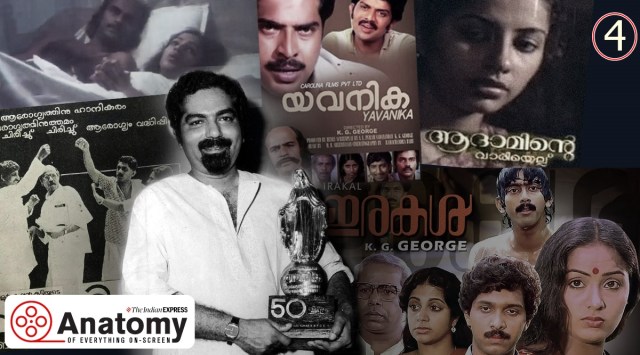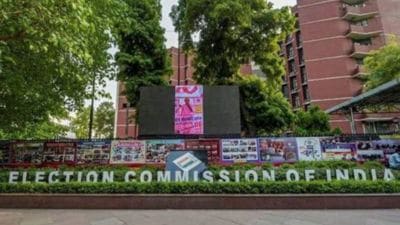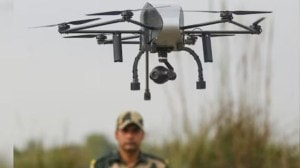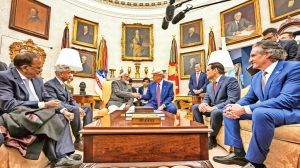Click here to follow Screen Digital on YouTube and stay updated with the latest from the world of cinema.
The anatomy of KG George’s Panchavadi Palam: One of the best political satires with profound influence on Kerala society even today
A standout among political satires that goes beyond mere rants, KG George's Panchavadi Palam offers a brilliant commentary on how politicians, motivated by their greed, work together, irrespective of their differing ideologies, to embezzle public funds.
 What makes KG George's Panchavadi Palam particularly fascinating is its skilful incorporation of characters, situations, and challenges that seemingly resonate with real-life experiences, despite the story's overtly fictional backdrop.
What makes KG George's Panchavadi Palam particularly fascinating is its skilful incorporation of characters, situations, and challenges that seemingly resonate with real-life experiences, despite the story's overtly fictional backdrop. Dussasana, Mandodari, Shikhandi, Jimutavahana, Kathavarayan, Anarkali, Jahangir, Judas, Barabbas and Putana: is there a remote possibility for these characters to be linked together? Sounds pretty far-fetched, doesn’t it? But hey, director KG George pulled off this crazy mythological and historical mashup in his 1984 film Panchavadi Palam.
A standout among political satires that goes beyond mere rants, Panchavadi Palam offers a brilliant commentary on how politicians, motivated by their greed, work together, irrespective of their differing ideologies, to embezzle public funds. Now, after discussing George’s Yavanika, Lekhayude Maranam Oru Flashback and Adaminte Variyellu, let’s anatomise KG George’s very unconventional political satire Panchavadi Palam (1984).
Adapted from Veloor Krishnankutty’s novel Palam Apakadathil, the movie unfolds in the fictional village of Airavatakuzhi. What makes Panchavadi Palam particularly fascinating is its skilful incorporation of characters, situations, and challenges that seemingly resonate with real-life experiences, despite the story’s overtly fictional backdrop.
In a pivotal moment in Adoor Gopalakrishnan’s Kodiyettam (1978), when a speeding truck splashes mudwater onto Shankarankutty (Bharath Gopi), he reacts with a simple “What a speed,” accompanied by a smile, underscoring his character’s innocence and naivety. However, in a similar incident involving Sikhandi Pillai (Nedumudi Venu), a local politician in Panchavadi Palam, he promptly begins persuading influential figures in the village to rebuild the bridge, illustrating how those in positions of power often prioritise their own interests. These initial scenes in George’s script itself effectively establish the film’s storyline.
Watch KG George’s Panchavadi Palam here:
In another moment, Sikhandi Pillai advises panchayat president Dussasana Kurup (Bharath Gopi) to repeatedly emphasise his commitment to developing the village during his speech at a meeting. When Kurup enquires how he can achieve village development, despite his role as the locality’s patron, Pillai retorts, “Who is genuinely going to develop it? What harm is there in making empty promises?” This succinctly underscores the typical behaviour of all politicos in Airavatakuzhi.
In contrast to movies like Sathyan Anthikad’s blatantly apolitical Sandesam, written by Sreenivasan, and films penned by T Damodaran, which seemed to glorify anarchy and the frustration of elites with the Indian constitution-assured democracy due to its hindrance to the thriving of the savarna culture, Panchavadi Palam takes a distinct approach when portraying politicians. In this film, the driving force behind politicians is primarily their greed, or in simpler terms, the insatiable pursuit of power is what motivated their entry into public politics.
What’s remarkable is that despite being released almost four decades ago, the film discusses the enduring issue of resort politics and the formation of various “committees” by politicians to extract money from the public for trivial reasons – practices that sadly remain prevalent even today.
In contrast to typical so-called political films where women often serve as mere background figures, and politics appears to be a predominantly male domain, Panchavadi Palam, much like George’s other works, prominently features women in significant roles. Even though Dussasana Kurup’s wife Mandodari (Sreevidya) isn’t a politician, she actively participates in crucial discussions, and her voice carries a firm authority, distinct from her husband’s. Panchayat member Rahel (Sukumari) also plays a pivotal role within Dussasana Kurup’s party, contributing significantly to the orchestration of major political manoeuvres. What makes Panchavadi Palam particularly intriguing is its refusal to patronise women and its portrayal of female characters as equally shrewd, driven by ambition, and occasionally flawed, thereby emphasising gender equality, without becoming misogynistic at any juncture.
Simultaneously, as soon as they realise that the reconstruction project promises substantial public funds, even the opposition indirectly aligns themselves with Kurup and his party, underscoring how financial gain serves as the primary motivation for everyone involved. During a significant alcohol-fuelled gathering at Kurup’s residence, opposition leader Isahak Tharakan (Thilakan), sarcastically remarks, “During panchayat meetings, we may argue and bicker, but it’s all for the public,” before adding with irony, “We’ll construct this new bridge, and if Kurup wishes, he can dismantle that too. But we should all be on good terms,” highlighting the prevailing mindset. In addition to these aspects, the movie also exposes revered demigods and how they take advantage of the public.
On the other hand, the sole character who mirrors an ordinary citizen is Kathavarayan (Sreenivasan), a differently-abled man who cannot walk. He stands out as the only person genuinely interested in politics, staying informed about current events and daily societal happenings. Significantly, he is the only one who tragically loses his life when the newly constructed bridge collapses in the climax of the film, underscoring that it is the common citizens who ultimately suffer the consequences of such wrongdoings perpetrated by politicians.
Featuring a talented ensemble cast, every actor skillfully embraces the caricaturish behaviours of their characters without making it feel forced or artificial. At the same, in this film, George brings forth a different dimension of Bharath Gopi’s talent, particularly because Dussasana Kurup differs greatly from the raw, brash, and rugged roles he portrayed in George’s earlier films. From Sreevidya, Nedumudi Venu, Thilakan and Sukumari to Jagathy Sreekumar, Sreenivasan, Venu Nagavally, KP Ummer, Alummodan, Innocent and Kalpana, all actors excel in their performances in Panchavadi Palam.
Though he is renowned for penning dark and serious subject matters, Panchavadi Palam emphatically highlights George’s skill in creating humorous films, particularly in the genre of political satire, executed with exceptional precision. The film’s influence on Kerala society has been so profound that even today, people frequently draw parallels between real-life political scenarios and instances from the movie. This connection became particularly evident during the Palarivattom flyover incident, almost as if the film had predicted that similar things would happen and the situation would persist unchanged even after four decades. Thus, Panchavadi Palam stands as another enduring classic that KG George contributed to the Malayalam film industry and society.
This article is one installment in a five-part series that anatomises five movies by ace Malayalam filmmaker KG George, who passed away on September 24. The series aims to unravel what set him apart as an extraordinary filmmaker


Photos


- 01
- 02
- 03
- 04
- 05






























